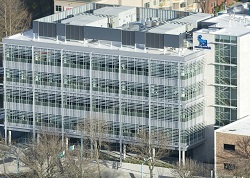 |
| Novo Nordisk's Seattle R&D center |
Novo Nordisk ($NVO) has made it official: The Danish drugmaker is making a full-fledged go at obesity R&D, looking to build a Seattle hub and hire up some investigators as it expands its research palate.
The new research unit will sit alongside the company's existing Type 1 diabetes outpost in Seattle, which opened in 2009. The obesity branch will initially employ about 10 people, Novo said, eventually growing to around 60 workers once fully operational in 2016. Around the globe, the company expects to devote the time of about 300 researchers to the obesity effort.
Novo's plan is to make obesity a full-fledged therapeutic area, sitting alongside the company's expansive efforts in diabetes and hemophilia and taking the place of inflammatory disease, from which the drug developer is walking away. Novo wants to use its first weight-loss candidate, the injectable Saxenda, as a springboard into building a portfolio of treatments.
To get there, the company has recruited Oregon Health & Science University's Kevin Grove to head up the Seattle center and lead as chief of its newly formed Division of Diabetes, Obesity and Metabolism. Grove's mission is to spotlight new approaches and targets for obesity while fleshing out the industry's broad understanding of the condition's underlying biology, Novo said.
"I'm looking forward to leading the Novo Nordisk Obesity Research Unit in Seattle and (gathering) a team of pre-eminent researchers within the obesity and endocrinology field," Grove said in a statement. "We have a real opportunity to make a meaningful difference in the management of this disease that impacts so many people globally."
Novo's move comes as the world of medicine increasingly looks at obesity as a chronic disease, much the way it considers diabetes, Chief Science Officer Mads Krogsgaard Thomsen has said. Novo and its $2 billion R&D operation know a thing or two about developing drugs for such ailments, and that, coupled with the global rise of obesity, has made expansion a natural next move for the company, Thomsen said.
However, despite Novo's mix of expertise and optimism, the potential market for weight-loss drugs remains a murky proposition. Two years ago, both Arena ($ARNA) and Vivus ($VVUS) won FDA nods for new obesity pills with blockbuster hopes, but safety concerns and payer disinterest led to disappointing launches, and both companies have struggled to gain any market traction. Just last week, Orexigen ($OREX) picked up FDA approval for Contrave, its long-delayed weight-loss treatment, but investors worry that the drug's daunting list of potential side effects will doom it to the same fate.
Novo will find out where it stands soon enough, as the company expects to win FDA approval next month for Saxenda, which is a higher dose of its blockbuster diabetes treatment Victoza (liraglutide). If all goes according to plan, an obesity indication could generate an extra $1 billion in annual sales for the drug.
But no matter the fate of Saxenda, Novo's interest in Seattle is good news for the city's in-transition biotech ecosystem. In July, Amgen ($AMGN) announced plans to shut down its operations in the city and its suburbs, closing a 750,000-square-foot research campus and axing 660 local jobs by 2015.
- read the news